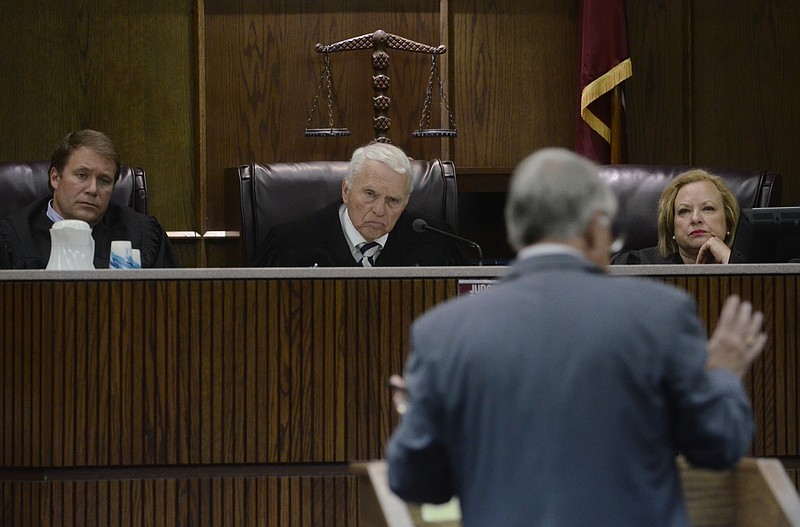Since last year, Chattanooga attorney Jerry Summers has worked to get a pool of local DUI cases tossed out based on what he says is an unconstitutional state law.
Upon conviction for certain crimes, including vehicular homicide and reckless driving, an individual must pay a $250 fee to the Tennessee Bureau of Investigation to cover the cost of a blood alcohol or drug concentration test fee, or "BADT." An additional $100 drug test fee might be tacked on to that cost as well.
Last year, the bureau received $3.2 million in those fee payments, according to the state Department of Revenue.
Summers contends the fees give the TBI an incentive to produce positive test results. The TBI argues there is no conflict of interest.
The case likely will land in front of the Tennessee Supreme Court and could affect every pending DUI case in the state.
In the midst of this back and forth, Summers last week obtained documents that underscore just how relevant this issue might be to Hamilton County. The county generated the third-highest rate of DUI payments in the state to the TBI in 2014, adding to what the bureau already says was a record year for DUI arrests.
In 2014, the TBI reaped about $182,000 in fees from blood tests performed in Hamilton County, state revenue department figures show. Hamilton County came in below Davidson County, which generated $329,400 in fees, and Rutherford County, which generated $263,705.
Fees gleaned from East Ridge, Red Bank, Collegedale and Soddy-Daisy totaled an additional $16,547.03.
The numbers coincide with a statewide push for DUI enforcement. Chattanooga Police Department spokesman Kyle Miller pointed out that between 2013 and 2014, the number of DUI fatalities in the city dropped from 14 to 5.
"Last year we saw more than a 60 percent reduction in DUI fatalities year-to-date," Miller said in a statement. "Our department enforces the law to save lives. The number one goal of our traffic department is to ensure -- through enforcement -- no one kills one of our community members due to irresponsible drinking and driving,"
Miller said the CPD doesn't generate revenue from DUI enforcement and doesn't enforce a quota system, an allegation that's been made against the Tennessee Highway Patrol and which is playing out in courts in Johnson City.
Meanwhile, Summers hopes to use the data to further his case.
In December, a panel made up of Criminal Court judges Rebecca Stern, Barry Steelman and Don Poole gave Summers some ground. They allowed information about the BADT to go into instructions given to juries before they head into deliberation. They didn't grant Summers' request for dismissal, but did grant an interlocutory appeal, or an appeal made before a resolution of the case, to be sent to the Court of Criminal Appeals.
The state argued that dismissal is premature, and wouldn't effectively dispose of some of the cases.
At the heart of Summers' argument is the suggestion that the TBI, a state body, is being paid to produce results that ensure a conviction. At the very least, he says, it creates an appearance of impropriety.
"I just don't think they should be getting that fee to testify to help convict somebody," Summers said.
Summers argues that violates defendants' due process rights.
But the TBI strongly disputes that allegation.
"TBI's forensic scientists dedicate their careers to getting it right, and to suggest there's a culture of conspiracy in our internationally accredited labs to profit from 'fudged' results is illogical," spokesman Josh DeVine said in a statement.
DeVine said TBI scientists don't know the details of particular cases as they test them, and only care about what the results might or might not contain.
"For decades, TBI has built and sustained a reputation of integrity in Tennessee. The public expects us to pursue truth and we do every day, for the sake of our credibility and more importantly, the trust of the people of Tennessee," DeVine said.
DeVine said state law allows the TBI to use BADT funds in a variety of ways. Summers argues those funds should go to the state's general fund.
The case's ultimate outcome could affect every pending DUI case in Tennessee, as well as any cases that have seen convictions but are still within the statute of limitations. Summers believes it could have consequences in 15 other states with similar laws, as well.
An appellate decision in either direction will likely spark an appeal to the state Supreme Court.
Contact staff writer Claire Wiseman at cwiseman@timesfree press.com. Follow her on Twitter @clairelwiseman.
